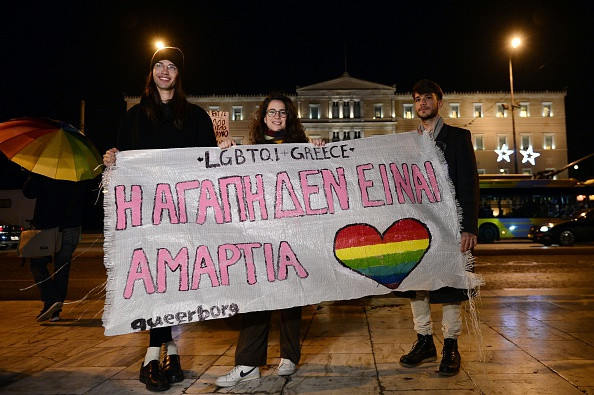Greece legalises same-sex civil union with strong Syriza backing

The Greek parliament has approved a much debated bill which now legalises civil partnerships for same-sex couples in a vote strongly backed by the governing leftist Syriza party, despite stiff opposition from the Greek Orthodox Church. The legislation grants same-sex couples the option of having civil partnerships, which would give them marriage rights but not necessarily the right to adopt children.
"This is an important day for human rights. This ends a period of backwardness and shame for the state, which led to our country receiving international rulings against it. Instead of celebrating, though, maybe we should apologise to hundreds of thousands of fellow citizens that have been denied their rights all these years," said Greek Prime Minister Alexis Tsipras, who many see as the pivotal force behind the change.
Σήμερα είναι και μια σημαντική μέρα για τα ανθρώπινα δικαιώματα, για την ισοτιμία όλων των συμπολιτών μας απέναντι στο νόμο. #EqualityGR
— Alexis Tsipras (@atsipras) December 22, 2015Σήμερα αναγνωρίζουμε τη δυνατότητα όλων των ανθρώπων, ανεξαρτήτως φύλου και σεξουαλικού προσανατολισμού, να συμβιώσουν. #EqualityGR
— Alexis Tsipras (@atsipras) December 22, 2015A total of 194 lawmakers voted in favour of the bill while 55 voted against it. The main opposition Democracy Party was split on the vote with only 29 of 75 deputies of the new conservative party backed the legislation. The nationalist Independent Greeks (ANEL), which is part of the governing coalition, also voted against the motion.
Greece's powerful Orthodox Church, which furiously opposed the legislation, argued that the bill undermines the institution of family. "Homosexuality is a deviation from the laws of nature. It is a social crime, a sin. Those who experience or support it are not normal people," Bishop Amvrosios of the southern town of Kalavryta told the Associated Press.
Not enough: Amnesty
Human rights watchdog Amnesty International hailed the move as a "historic step" but said lesbian, gay, bisexual, transgender and intersex (LGBTI) persons still faced hostility in Greece. "Despite this first step, LGBTI people in Greece still live in a climate of hostility from which the authorities are failing to protect them adequately. Physical attacks are on the rise, hate speech is common and goes unchecked by the authorities. Even displays of affection between same-sex couples are censored on television," Gauri van Gulik, Amnesty International's deputy director for Europe and Central Asia, told AFP.
In 2013, the Council of the European Court of Human Rights deemed Greek legislation to be discriminatory and ordered Greece to pay damages worth €5,000 (£3,680, $5,470) each to a gay couple who brought a lawsuit. Under the country's laws, often criticised by the EU, male and female same-sex sexual activity is not criminal but households headed by same-sex couples are not eligible for the same legal protections available to opposite-sex couples.
© Copyright IBTimes 2025. All rights reserved.





















